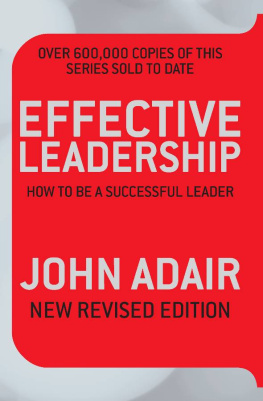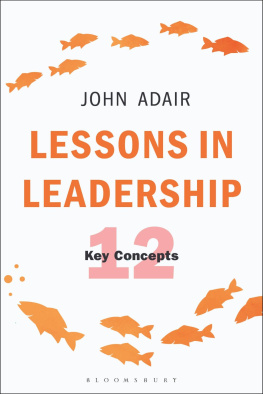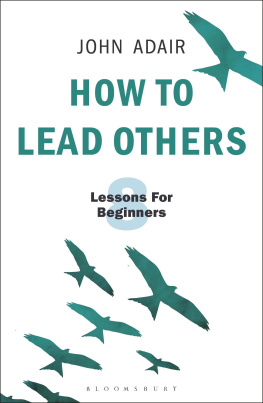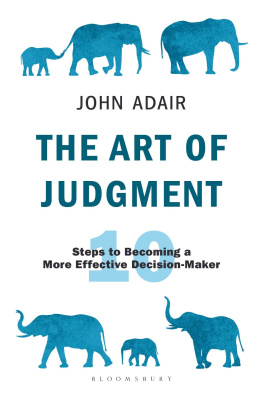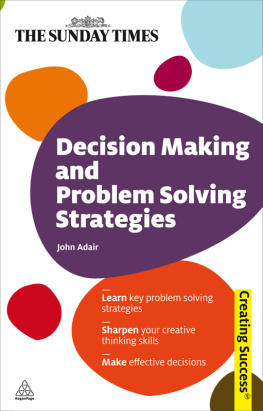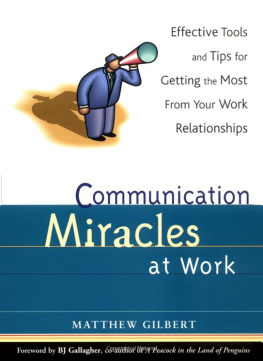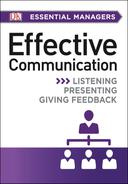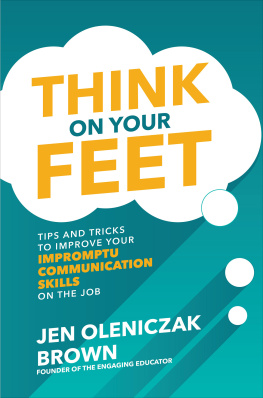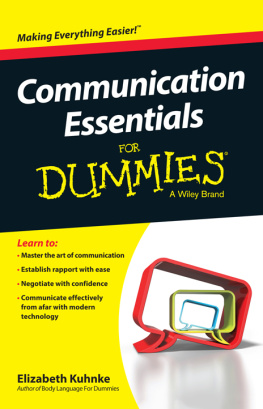John Adair - Effective Communication
Here you can read online John Adair - Effective Communication full text of the book (entire story) in english for free. Download pdf and epub, get meaning, cover and reviews about this ebook. year: 2009, publisher: Pan Macmillan UK, genre: Religion. Description of the work, (preface) as well as reviews are available. Best literature library LitArk.com created for fans of good reading and offers a wide selection of genres:
Romance novel
Science fiction
Adventure
Detective
Science
History
Home and family
Prose
Art
Politics
Computer
Non-fiction
Religion
Business
Children
Humor
Choose a favorite category and find really read worthwhile books. Enjoy immersion in the world of imagination, feel the emotions of the characters or learn something new for yourself, make an fascinating discovery.
- Book:Effective Communication
- Author:
- Publisher:Pan Macmillan UK
- Genre:
- Year:2009
- Rating:4 / 5
- Favourites:Add to favourites
- Your mark:
- 80
- 1
- 2
- 3
- 4
- 5
Effective Communication: summary, description and annotation
We offer to read an annotation, description, summary or preface (depends on what the author of the book "Effective Communication" wrote himself). If you haven't found the necessary information about the book — write in the comments, we will try to find it.
Strong communication skills are arguably the most important attribute a manager can possess. Many managers believe they have already mastered the four basic communication skills - speaking, listening, writing and reading - but many simply go through the motions.
Including helpful advice on interviews, appraisals, giving and receiving criticism, conducting and participating in meetings, the use of visual aids, communication between departments and much more, this is the ultimate tool for improving your communication skills and helping you become a better manager.
Effective Communication — read online for free the complete book (whole text) full work
Below is the text of the book, divided by pages. System saving the place of the last page read, allows you to conveniently read the book "Effective Communication" online for free, without having to search again every time where you left off. Put a bookmark, and you can go to the page where you finished reading at any time.
Font size:
Interval:
Bookmark:
COMMUNICATION
THE MOST IMPORTANT MANAGEMENT SKILL OF ALL
PAN BOOKS
Communication skills are essential in leading, managing and working with others. The aim of this book is to help you to improve your competencies and capability in the art of practical communication.
An understanding of the NATURE OF COMMUNICATION is the foundation, and this is the subject of the first chapter. This is followed by THE COMMUNICATION STAR, a useful model of framework. The historical case study in Chapter 3 gives you an opportunity to apply what you have learnt so far.
The four skills of SPEAKING, LISTENING,WRITING and READING form the themes of Chapters 4, 5, 6 and 7. Of course we all have grounding and ability in these skills, and so it is more a matter of sharpening and honing them in the context of daily working life. If you aspire to lead or manage others you do have to be really competent in these skills, because communication is the brother and sister of leadership. The Five Principles of Good Speaking, which also double up as general Principles of Communication BE SIMPLE, BE PREPARED, BE CLEAR, BE VIVID and BE NATURAL are also introduced in these chapters. It will serve you well to tie these principles firmly to your mast as they can be applied to all forms of communication and hence come up throughout the book.
Four situations that pose problems of communication in which you will find yourself as a leader are discussed in Part Three. PRESENTATIONS are formal speeches; they usually involve audio-visual aids and are sometimes done by more than one speaker working as a team. INTERVIEWS are essentially one-to-one meetings with a purpose. From the communicating angle, perhaps the most difficult aspect is giving and receiving praise and criticism. Managing communication in group MEETINGS is obviously an essential part of any managers work. Lastly, ORGANIZATION the general situation or context of managerial work solves some communication problems but creates others.
It follows that to be an effective communicator, you need to develop an understanding of your PERSONAL skills, your ability to lead communication in GROUPS and your effectiveness in the downward, upward and sideways flows of information and ideas in ORGANIZATIONS including, of course the interactions of the organization with its customers. Here, then, are the contents at a glance:

Remember that the purpose of the following pages is to stimulate your own thoughts and ideas about communication at work. They should lead you to identify some practical ways in which you can improve your skills both as a communicator and as a manager of communication.
HOW TO USE THIS BOOK
In order to benefit most from this book it is best to read it once to get a general understanding of its contents. Then go back and work through the checklist questions and exercises. If you can persuade a friend or colleague to monitor your answers, even better.
Do not assume that you have to start from the beginning and read through to the end. Even within a chapter you may prefer to complete the checklist before reading the chapter, rather than afterwards. Decide your strategy for using the book now, according to your depth of interest and preferred method of learning.
I suggest that you have a pencil and paper at hand when you study the book more closely. Write down any action points. And dont be afraid to write on the book I wont mind! Underline or mark any passages that are important to you personally in terms of your own AWARENESS, UNDERSTANDING and SKILL.
This book will give you guidance not only on when to communicate and why it should be done, but also how it should be done. It is concerned with skills in a wide sense, namely the methods you must practise in order to achieve your desired aim of becoming a better communicator. But this book will not teach you much about techniques in the narrower sense techniques that are often taught at the expense of the art of communication as a whole. Concentrate on the basics and leave the tricks-of-the-trade to the charlatans.
In order not to hold you up unnecessarily on your first fast-track read, youll find some material relevant research and other contributions in boxes within the text. Again, be selective about them. You can skip past a box without any loss to the main themes of the book if you prefer.
The key points at the end of each chapter are designed to give you an aide-memoire of the whole contents. Just to keep you on your toes I have occasionally slipped in one or two extra points ones you wont find in the preceding chapter.
I hope you enjoy reading the book as well as finding it useful and profitable. I have certainly enjoyed writing it.
John Adair, 2009
COMMUNICATION
The peoples of the world are islands shouting at each other across a sea of misunderstanding.
George Eliot, English author
These words remind us that lack of communication is endemic in our human condition. Loud shouting and even violence are symptoms of the ailment, not remedies. Without communication we remain isolated, stranded on our islands, divided rather than united. To diagnose the nature of communication is as important for us now as individuals, groups and nations as the discovery of the secrets of the atom was for our grandfathers. We have to discern the forces that create human unity not those that split matter with a crash invisible forces that can conquer the sea of misunderstanding and bind our hearts together. The technical problems of long-range communication have been solved; the more central and elusive nature of good communication in human relations remains to be charted.
But what does this long, formidable word communication mean? Some verbal archaeology may help. Using the Shorter Oxford English Dictionary in this case, we can unravel the meanings that the word communication has acquired down the centuries. First, it comes from the same Latin root as common, namely the word communis, whose own roots are shrouded in mystery. The first part of it presents no difficulties, for com is known to be an English version of cum (with). The second part, munis, descends either from moinis (bound), or from the early Latin oinos (one). Dr Samuel Johnson, author of the Dictionary of the English Language published in 1755, defined the first and major family of meanings of the word common thus: belonging equally to more than one.
Our medieval forefathers used common as a verb much as we use communicate nowadays. Until the beginning of Queen Elizabeth Is reign in the mid-sixteenth century, an Englishman might have spoken of commoning with his friends about his work, rather than of communicating with them. However, commoning might equally have meant that he was eating with friends at a common table in the great hall of some manor house or college, pasturing his pigs on the common land, or partaking in the Holy Communion or Mass at the parish church. Behind all these uses is the central idea of sharing: something is available for all to share in it. Thus it is general and not private, a joint rather than an individual possession, one which is accessible freely to others.
To communicate, a verb that entered the language about the time that Henry VIII was having problems with his six wives, took over the dual senses of giving to another as a partaker and making available something for a general sharing. Communication came to mean the action of imparting, conveying or exchanging or, more concretely, that which is communicated, such as a letter or its contents. Although the Christian religion has retained communicate and Communion for the sharing of the sacramental elements of the Eucharist, the words are now rarely used in regard to material things. Almost exclusively, communication now refers to the giving, receiving or sharing of ideas, knowledge, feelings the contents of the mind, heart and spirit of man by such means as speech, writing or signs.
Font size:
Interval:
Bookmark:
Similar books «Effective Communication»
Look at similar books to Effective Communication. We have selected literature similar in name and meaning in the hope of providing readers with more options to find new, interesting, not yet read works.
Discussion, reviews of the book Effective Communication and just readers' own opinions. Leave your comments, write what you think about the work, its meaning or the main characters. Specify what exactly you liked and what you didn't like, and why you think so.



